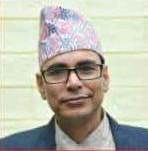BIO
Hemant Biwas, (b. 1974) hails from the Doti district of Nepal. He has made himself known through his metrical poems and songs to Nepali readership. His first collection of prose poems titled Saipalko Angan was launched in 2011. In 2011, he was declared the best lyricist of the year by Radio Nepal. He has published several CD albums and a poetry collection titled Afnai Mann Sanga, and a collection of songs titled Katha Eutai Timro Mero. He has also been a regular contributor to many national dailies and journals in Nepal. He writes on issues concerning the cultural life of far-western Nepali regions.
.
BIO
Mahesh Paudyal, born in 1982, is a Kathmandu based poet, story writer, critic, translator, and playwright. He has twelve books to his credit, which include stories, novels, plays, and criticism. He is also an active literary activist, and a teacher of English literature at Tribhuvan University.
.
The Plowman
Jadau1 Gosain2!
Didn’t you recognize me?
I am Hali, your plowman,
and you, my ancestral glory.
I cannot tell for sure
whether your fingers—soft and gay
running on the keyboards of laptops and cell phones
ever had a soil smear?
Year after year, however,
with the moisture and the warmth of the same soil
on earth, I have made your farm lush green.
I have been a porter of salt for your pantry
and lime for your porch.
Gosain,
I am the same plowman
with scraped tissues of his calves and shoulders
with a lump of soil on the tip of his hoe,
bending over to plow
in a loincloth.
Oh, how I walked over the hills in those days
and brought home bundles of Sabai-grass
that grew licentious on the slopes
like the tresses of a maiden,
who nonchalantly spreads her locks
as she flickers along to watch a fair!
Then your front-yard used to be wiped so clean.
And, when the steep trails on the hill
would climb with me a formidable height
every morning;
only then something sumptuous
would cook on your woodstove!
Till late in the evening
with nothing to cover my chilling body,
but the moonlight spreading,
I have stood in your front yard, chopping woods
to light your hearth.
But Gosain, ever since you have left for Madhes,
you stopped recognizing your old, abandoned workman!
But I have no grudges.
I have plowed the field
where RipuMalla’s days were unearthed;
and the wares found, being showcased in Naipal3 today
I am told by someone, but not dismayed,
even the wares do not know, who am I!
Tomorrow I shall spot
the stone of ArjunShahi4 my father had carried
all the way, on his bare shoulders.
Its length, breadth, and height
can possibly fit into your camera’s lens,
but then, your device can never accommodate
the weal over my bruised back,
for whom I am a plowman.
Just a plowman, nothing more!
A chakmak5, turf and white river stones
are no less valuable to me
than your gadgets: cell, camera or laptop.
My belongings covered in dust
are attached to the earth;
like the earth connected to
Deuda, Dhamari, and Chait6
sung during festive seasons
that come around every year!
Yet, I am the same luckless plowman
who plowed Sita out of the earth,
but was denied entry at the gate
where a shrine was built in her honor7.
The life I have spent plowing your fields
is crumbling today, like the ruins of Doti Fort
and yet, I plow on and on,
along the same narrow ridge.
Though my days are crouch
on a darkening, western hilltop,
like the receding sun,
I do not know why, the soil
still loves to cling to me.
I know, my good lord
from the top of your mansion,
you won’t be able to see me clearly
as I stand below, on the street.
Yet I know that
your magnificent dwelling
stands nowhere
but on the same soil
where I stand
right now.
*****
1. An ancient way of greeting in Nepali
2. Gosain: An address of honor, used by workmen for their masters of higher castes.
3. Nepal, in Doteli people’s accent
4. A prince of Doti, is believed to have received only a stone and a Jamun tree as his share of property from his father. Legend says, the tree was planted at Dumrakot and the stone, carried by a plowman was placed beneath it, where people sat to decide on cases and disputes.
5. Chakmak is a knife with a blunt edge. When it is struck against a white river-stone, it sparks, and helps making fire.
6. Folk songs popular in western hills of Nepal
7. The Myth says, Sita the princess of Ayodhya was found inside a pot under the earth when it was being plowed.
.
हली
जदौ गोसाइँ
चिन्नु भो ?
तपाइँ मेरो पुर्खाको गौरव
म उही हली हुँ मालिक
तिम्रा मोबाइल र कम्प्युटरमा दगुर्ने औंलामा
टाँसिए टानँसिएनन् माटाका कणहरु
त्यही माटोको आद्रता ओढेर
त्यही माटोको सुवास बोकर
झुलाएको थिएँ अन्न बाली
वर्षौ वर्षसम्म
र
बनेको थिएँ
भन्साको नूनदेखि कौसीको चुनसम्मको ढाक्रे
पेटमा पटुका बाँधेर
हलोसँगै पिँडुला रपाखुराको मासु जोत्ने
म उही हली हुँ गोसाइँ
काटेर ल्याउथेँ
जात्रा हेर्न हिँडेकी युवतीको
बैंस छर्दै गरेको उन्मत्त कपाल झैं
भीरको बाबियो
र पो बढारिन्थ्यो तिम्रो कौसी
उकालो घन्टौं हिँड्थ्यो मसँगै
डोकोभरीको सानो पसल बोकेर
र पो पाक्थ्यो तिम्रो भान्सामा परिकार
साँझ अबेरसम्म जूनको उज्यालो ओढेर
सोझ्याईरहन्थे आँगनमा अचानो
र पो जोगिन्थ्यो तिम्रो अँगेनामा आगो
मधेस झरेपछि त चिन्न पनि छोड्नु भएछ क्यारे !
ठिकै हो
त्यही मिाटो जोतेर निकालेको हुँ
रिपुमल्लका पालाका माटाका भाँडाहरु
जुन आज नेपालमा छन् रे
चिन्दैनन् तिनले पनि
भोलि फेला पार्नेछु
मेरै हजुरबाले बोकेर ल्याएको
अर्जुन शाहीको शीला
जसको लम्बाइ, चौडाक्ष् र उचाइ
अटाउनेछ तिम्रा क्यामरामा तर कहिल्यै अट्ने छैन
मेरो पिठ्यूँको डाम
किनकि म हली हुँ मालिक, हली
तिम्रो मोबाइल, क्यामरा र ल्यापटपभन्दा
बहुमुल्य छन् मैले बोकेका चकमक, झुलो र दर्शनढुङ्गा
यिनमा टाँसिएका छन् माटोका कणहरु
माटोका कण टाँसिएको जिन्दगी छ मसँग
हरेक पर्व पर्वादीहरु र तिनमा गाइने डेउडा,धमारी र
चैत
सबैमा देख्छु मैले माटाका तिनै कणहरु
तर पनि हलो जोतेर सीता उब्जाउने
सीताको मन्दिरमा कहिल्यै जान नपाउने
म उही अभागी हली हुँ मालिक
प्रायः जसो तिम्रै खेतमा जोतिएको
डोटी गौडाको किल्लाको भग्नावशेषजस्तो जिन्दगी
जोत्दै छु आज उही गोरेटोमा
डाँडामाथिको घाम बनिसक्दा पनि
थाहा छैन
किन छोड्दैनन् माटाका कणहरुले मसँग साइनो गाँस्न
मलाइ थाहा छ,
माथि, महलबाट हजुरले
तल, माटोमा उभिएको म हलीलाई
त्यति सजिलै देख्नुहुन्न,
आखिर जेसुकै भए पनि
हजुरको गगनचुम्बी महल पनि त
माटोमै उभिएको ।
*****



